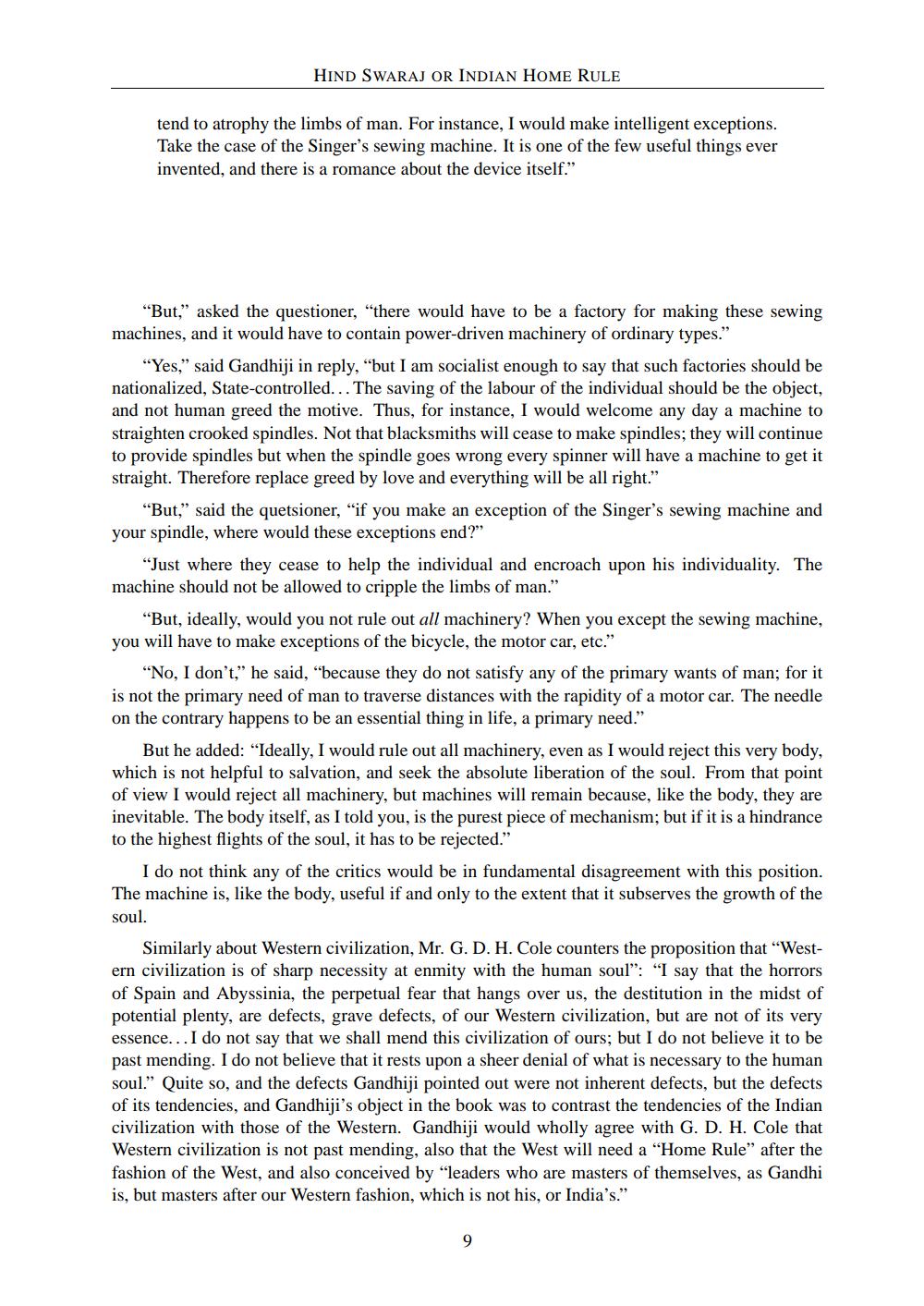Book Title: Indian Home Rules Gandhiji Author(s): Mohandas Karamchand Gandhi, Gandhiji Publisher: Yann Forget View full book textPage 9
________________ HIND SWARAJ OR INDIAN HOME RULE tend to atrophy the limbs of man. For instance, I would make intelligent exceptions. Take the case of the Singer's sewing machine. It is one of the few useful things ever invented, and there is a romance about the device itself." "But," asked the questioner, "there would have to be a factory for making these sewing machines, and it would have to contain power-driven machinery of ordinary types." "Yes," said Gandhiji in reply, “but I am socialist enough to say that such factories should be nationalized, State-controlled... The saving of the labour of the individual should be the object, and not human greed the motive. Thus, for instance, I would welcome any day a machine to straighten crooked spindles. Not that blacksmiths will cease to make spindles; they will continue to provide spindles but when the spindle goes wrong every spinner will have a machine to get it straight. Therefore replace greed by love and everything will be all right." “But," said the quetsioner, “if you make an exception of the Singer's sewing machine and your spindle, where would these exceptions end?" "Just where they cease to help the individual and encroach upon his individuality. The machine should not be allowed to cripple the limbs of man. "But, ideally, would you not rule out all machinery? When you except the sewing machine, you will have to make exceptions of the bicycle, the motor car, etc." "No, I don't," he said, “because they do not satisfy any of the primary wants of man; for it is not the primary need of man to traverse distances with the rapidity of a motor car. The needle on the contrary happens to be an essential thing in life, a primary need." But he added: "Ideally, I would rule out all machinery, even as I would reject this very body, which is not helpful to salvation, and seek the absolute liberation of the soul. From that point of view I would reject all machinery, but machines will remain because, like the body, they are inevitable. The body itself, as I told you, is the purest piece of mechanism; but if it is a hindrance to the highest flights of the soul, it has to be rejected." I do not think any of the critics would be in fundamental disagreement with this position. The machine is, like the body, useful if and only to the extent that it subserves the growth of the soul. Similarly about Western civilization, Mr. G. D. H. Cole counters the proposition that "Western civilization is of sharp necessity at enmity with the human soul": "I say that the horrors of Spain and Abyssinia, the perpetual fear that hangs over us, the destitution in the midst of potential plenty, are defects, grave defects, of our Western civilization, but are not of its very essence... I do not say that we shall mend this civilization of ours; but I do not believe it to be past mending. I do not believe that it rests upon a sheer denial of what is necessary to the human soul." Quite so, and the defects Gandhiji pointed out were not inherent defects, but the defects of its tendencies, and Gandhiji's object in the book was to contrast the tendencies of the Indian civilization with those of the Western. Gandhiji would wholly agree with G. D. H. Cole that Western civilization is not past mending, also that the West will need a "Home Rule" after the fashion of the West, and also conceived by "leaders who are masters of themselves, as Gandhi is, but masters after our Western fashion, which is not his, or India's."Page Navigation
1 ... 7 8 9 10 11 12 13 14 15 16 17 18 19 20 21 22 23 24 25 26 27 28 29 30 31 32 33 34 35 36 37 38 39 40 41 42 43 44 45 46 47 48 49 50 51 52 53 54 55 56 57 58 59 60 61 62 63 64 65 66 67 68 69 70 71 72 73 74 75
